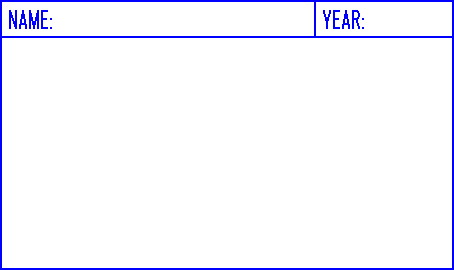
| 12V / 24V 10 Amp (minimum) |
| 5 pixel width 7 pixel height per character; 15 character display (15 panels) |
| ---- |
Gulton Industries, Luminator Div. LIDS IV - Side

| 5 pixel width 7 pixel height per character; 15 character display (3 panels of 5) |
| 1986 |
Gulton / Luminator MAX - Front

| 5 pixel width 7 pixel height per character; 15 character display (3 panels of 5) |
| 1986 |
Gulton / Luminator MAX - Side
| Electronic Sign Gallery Gulton Industries Ltd. (Including Transign and Luminator LIDS hybrids) |

Gulton Ind. Control Console
| 1986 |

Luminator Control Console
| 1987 |

Gulton Ind. Dial Pad Console
| 1989 |

| 1990 |
Luminator "Slim" Control Console with
Updated Connectors & Expanded Memory
Updated Connectors & Expanded Memory

| 12V / 24V 10 Amp (minimum) |
| 5 pixel width 7 pixel height per character; 15 character display (3 panels of 5) |
| ---- |
Gulton Industries First Generation Flipdot - Front
| 12V / 24V 10 Amp (minimum) |
| 12V / 24V 10 Amp (minimum) |

| 12V / 24V 10 Amp (minimum) |
| 5 pixel width 7 pixel height per character; 15 character display (3 panels of 5) |
| ---- |
Gulton Industries First Generation Flipdot - Side

| 24V / 10 Amp (minimum) |
| 5 pixel width 7 pixel height per character; 15 character display (3 panels of 5) |
| 1981 |
Transign TransDOT/Gulton Hybrid Flipdot - Front
| To make the Transign TransDOT signs compatible with the Gulton/Luminator Control Console units, the power and data signals are sent through a Conversion Unit, built by Luminator. |

| 12V / 24V 10 Amp (minimum) |
| 5 pixel width 7 pixel height per character; 15 character display (15 panels) |
| ---- |
Gulton Industries, Luminator Div. LIDS IV - Front

| Gulton Ind. Dash Mount Console |
| ---- |

Gulton Ind. Button Grid Console
| 1981 |

| 12V / 24V 10 Amp (minimum) |
| (Route number) 8 pixel width, 14 pixel height (9") per character; (1 panel of 3) (Destination Panel) 5 pixel width 7 pixel height (6.5") per character; 15 character display (3 panels of 5) |
| 1986 |
Gulton / Luminator MAX Split Sign - Front
| Route name sign |
| Number sign |

| 12V / 24V 10 Amp (minimum) |
| (Route number) 5 pixel width, 7 pixel height (6.5") per character; (1 panel of 3) (Destination Panel) 5 pixel width 7 pixel height (3") per character; 15 character display (3 panels of 5) |
| 1986 |
Gulton / Luminator MAX Split Sign - Side
| Route name sign |
| Number sign |

| 12V / 24V 10 Amp (minimum) |
| 5 pixel width 7 pixel height per character; 4 character display (1 panel) |
| 1986 |
Gulton / Luminator MAX - Rear (4 Character, 6.5" ht.)

| 12V / 24V 10 Amp (minimum) |
| 8 pixel width 14 pixel height per character; 3 character display (1 panel) |
| 1986 |
Gulton / Luminator MAX - Rear (3 Character, 9" height)
| My fascination with electronic destination signs began when the Toronto Transit Commission (Toronto, Ontario) started introducing them in their fleet in 1991. Through some fluke (or slip up) in 1996, one of the TTC's GMC New Looks went to scrap with its Luminator electronic signs still installed, and with that my collection began. I studied the system and how it worked, it's intricasies and limitations. Over the years, my collection expanded, with my first Gulton/Luminator system in 1998, my first Vultron TransDot system in 2007, and Luminator Horizon system in 2010. In May of 2000, I supplied Brampton Transit (Brampton, Ontario) with a refurbished Luminator sign for their Leyland Olympian double decker bus. In September, 2000, I supplied Barrie Transit (Barrie, Ontario) with five sets of refurbished Luminator signs for their newest buses at the time, three of which were known to be retrofitted with the signs I supplied. Overall my experience with electronic signs spans about 30 years, collecting over 50 different models/specifications of electronic signs, and dozens of different system programs for the various models. The electronic sign gallery and collection have been broken up into their individual manufacturers. Click or tap on a logo below to see the signs and controllers from each specific manufacturer in the collection. The logo outlined in green is the collection page you are currently viewing. |


































| (Including LUMINATOR LIDS and TRANSIGN/GULTON Hybrid signs) |

| to see various sales brochures from Gulton and learn the company's corporate history. |






